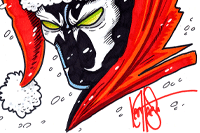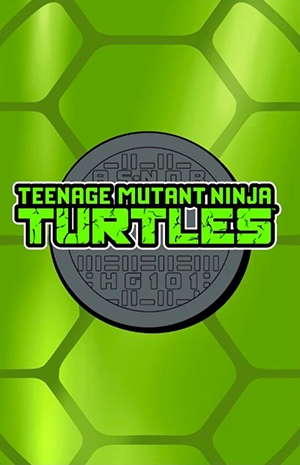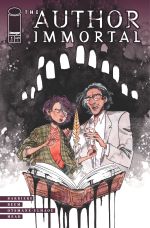DARYL GREGORY
 SEND THIS TO A FRIEND! SEND THIS TO A FRIEND!
DF Interview: Daryl Gregory explores the murky depths of horror in Harrison Squared By Byron Brewer Harrison Harrison—H2 to his mom—is a lonely teenager who’s been terrified of the water ever since he was a toddler in California, when a huge sea creature capsized their boat, and his father vanished. One of the “sensitives” who are attuned to the supernatural world, Harrison and his mother have just moved to the worst possible place for a boy like him: Dunnsmouth, a Lovecraftian town perched on rocks above the Atlantic, where strange things go on by night, monsters lurk under the waves, and creepy teachers run the local high school. On Harrison’s first day at school, his mother, a marine biologist, disappears at sea. Harrison must attempt to solve the mystery of her … accident. From award-winning author Daryl Gregory comes a thrilling and colorful Lovecraftian novel of a teenage boy searching for his mother, and the macabre creatures he encounters. Dynamic Forces spoke to the scribe about his latest non-comics work. Dynamic Forces: Congratulations on your new novel, Harrison Squared, Daryl. Tell us how this came about. Daryl Gregory: Thanks, Byron. I owe my son for this book. He’s been a huge Lovecraft fan since middle school, and as we talked about those old stories, I got the idea of writing a book my son would love. Years later, I finally got around to it. It’s not pure Lovecraftian horror, though. The book is more of an adventure and mystery with the trappings of horror. Also, I just can’t buy into H.P. Lovecraft’s blinkered and racist take on the world, with the “degenerate” races somehow being in league with the elder gods, so in this book, that trope gets thoroughly subverted. DF: Harrison Squared, a curious title. Tell us a little about your protagonist and the storyline herein. Daryl Gregory: “Harrison Squared” is the family nickname of the hero of the book, Harrison Harrison. He comes from a family of scientists, so geek humor is highly prized. And Harrison himself is a bit of a geek. He’s sixteen, and he has anger management issues, but he’s brainy, and he keeps functioning even when the goings get weird. And things get very weird. There are half-human, half-fish hybrids, immortal serial killers, souls trapped in bone, various other monsters. It’s a romp, basically. DF: Harrison has had an awful tough life, what with the accident that took his father and then his mother disappears. How does he keep his wits about him? Daryl Gregory: Everything goes back to that boating accident when he was three. Harrison lost his right leg below the knee in that accident, and his father drowned. His mother told him it was an ordinary accident, but Harrison has vague memories of tentacles and teeth and something huge in the water. Harrison and his marine biologist mother move from San Diego to Dunnsmouth, Massachusetts, supposedly so she can study an elusive colossal squid. But when she disappears at sea, Harrison begins to learn the truth about things. His mother’s disappearance was no accident, his own childhood accident happened in Dunnsmouth, not California, and her returning here was no coincidence. Also, she definitely wasn’t searching for a squid. DF: Describe for us the town to which Harrison and his mom live: Dunnsmouth. Daryl Gregory: Dunnsmouth is practically a character in the book. It’s a tiny, damp fishing village on the coast whose major exports are creepiness and fog. The cell coverage is nil, the internet hasn’t reached town yet, and the kids go to school in an ancient stone temple. A bizarre religious service happens every morning before school, and Harrison’s definitely not invited. The other students seem to be obedient, but he soon finds out there are rebels among them—a secret society called The Involuntaries. DF: Harrison, despite living by the Atlantic, has been terrified of the water since he was a toddler. Where does he get the strength to strive and solve the mystery of his mother’s “accident”? Daryl Gregory: I think Harrison’s inner resolve is a mystery even to Harrison. He was exposed to capital W Weirdness when he lost his leg, and it’s almost as if he’s been inoculated against eldritch shocks. In Lovecraft stories, heroes go insane when they see the truth of the world, but Harrison handles it, and keeps moving forward. DF: There are any number of big-bads here. Start with the Dwellers and tell us about them. Daryl Gregory: The Dwellers are an ancient race of humanoid fish people who live just outside the bay. This is an old idea in Lovecraft--the secret, underwater species--but I always wondered, what do these people do all day? So one of the characters in my book is Lub, a Dweller who’s fascinated with human culture, including comic books. He knows some things about what happened to Harrison’s mother, and the two become friends. Readers can expect a lot of debates about the utility/futility of Aquaman. More dangerous than the Dwellers are the humans, such as the teachers at Dunnsmouth Secondary, who seem be leading a cult, and the human-dweller hybrids. One such is the immortal serial killer called the Scrimshander--he does evil things with a knife. DF: Does Harrison have any allies in his corner to help him cope with these dangers? Daryl Gregory: Besides Lub, there’s Lydia, who is one of the Involuntaries. The kids are not on board with some of what the adults are doing, and their goals and Harrison’s coincide. The other ally is Harrison’s Aunt Sel, who moves to take care of him during the search for his mother. Aunt Sel, though, is hardly maternal. She’s a sardonic, gin-drinking socialite—think Dorothy Parker on a late night bender—who’s not anyone’s definition of a responsible adult. DF: Last year you published a short novel called We Are All Completely Fine, which featured a support group for survivors of supernatural events. One of the group members is named Harrison Harrison. Is this the same hero of Harrison Squared? Daryl Gregory: Yes and no! After I wrote the first draft of Harrison Squared, but before I sold the novel, I began to wonder what happened to people like Harrison who were the “final girls” and lone survivors of horror movies and stories. So We Are All Completely Fine put in one room the last surviving victim of a Texas Chainsaw Massacre-style family, the survivor of a techno-horror story much like The Ring, and the final girl of an 80s slasher flick who faced a serial killer called--wait for it--the Scrimshander. One of the members is a grown man named Harrison Harrison, and he’s the first to realize that all the patients’ stories are interconnected. Harrison’s got a serious case of PTSD, but he’s annoyed that the horrors of his childhood were made into a series of light adventure books. So the question the reader of Harrison Squared has to ask: Am I reading the book that grown-up Harrison is complaining about, or is this the real story? I’ll answer that eventually ... DF: I know you have been asked this a thousand times, but take us through and compare your particular processes for doing a novel vs. a comic series. Daryl Gregory: Comics are short, and they’re all about structure--hitting the right beats, exactly at the right turn of the page, and ending with a snap or a cliffhanger on the last page. My job is to get the story, structure, and dialogue to work. But most of the heavy lifting for the emotion in the book, and its effectiveness, is in the hands of the artist. My job is to put the minimum number of words on the page and let the art shine. I often write comics in outline mode, mapping out each page, before I write any dialogue. With a novel, all the heavy lifting is on me. That’s both wonderful and daunting. I do outline my novels, but the form is so flexible. Every book I’ve written has a different structure, a different length, and a different tone. And I’m constantly rewriting. You’re building a house (or a castle, if it’s that kind of novel) out of sentences, and get them wrong and the whole thing comes crashing down. DF: What is coming next, comics-wise and otherwise, from Daryl Gregory? I have been working on the Legenderry: Green Hornet mini-series for Dynamite. And unfortunately I can’t talk about the next comics project, but I’m pretty excited about it. In the prose world, it’s always the next novel. I’m about halfway done with a long, intergenerational novel about a family of feeble psychics. It’s tremendous fun. Dynamic Forces would like to thank Daryl Gregory for taking time out of his busy schedule to answer our questions. Harrison Squared, a novel from Tor Books, is now available! For more news and up-to-date announcements, join us here at Dynamic Forces, www.dynamicforces.com/htmlfiles/, “LIKE” us on Facebook, www.facebook.com/dynamicforcesinc, and follow us on Twitter, www.twitter.com/dynamicforces.
NEW! 1. 09/23/2025 - FRANK BARBIERE2. 09/16/2025 - RODNEY BARNES 3. 09/10/2025 - ZACK KAPLAN 4. 08/26/2025 - JOE PRUETT 5. 08/20/2025 - CHRISTIAN WARD Show All |







